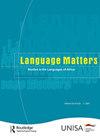Indexicalities in Code-Switching Practices across Namibian Ethnicities
IF 0.8
3区 文学
0 LANGUAGE & LINGUISTICS
引用次数: 1
Abstract
Abstract This study addresses the question of how multilectal behaviours can become stylistically functional. It proposes as a case study informal multilectal behaviours in Namibia, where indigenous languages co-exist with English and Afrikaans, the country’s lingua francas. The data involve informal intra-ethnic interactions featuring five Namibian ethnicities. A turn-by- turn analysis seeks to establish whether the participants’ code-switching patterns possess sequential salience and thus stylistic potential. Subsequently, an ethnographic perspective is taken to confirm whether this stylistic potential translates into sociolinguistic indexicalities. The study finds that—apart from white Namibians—the ethnolinguistic groups involved tend to display comparable interactional patterns of convergence/divergence in their code-switching behaviours, suggesting that the participants attach stylistic potential to code-switching. The ethnographic perspective links English to authority/worldliness, native languages to ingroupness, and L2 Afrikaans varieties to “street smart” attributes. Additionally, it shows that specific code-switching patterns are used as balancing acts between these values.纳米比亚各民族语码转换实践的索引性
摘要这项研究解决了多分支行为如何在风格上发挥作用的问题。它建议将纳米比亚的非正式多语言行为作为一个案例研究,在纳米比亚,土著语言与英语和南非荷兰语共存,南非荷兰语是该国的通用语。数据涉及以五个纳米比亚种族为特征的非正式种族内部互动。逐一分析试图确定参与者的代码转换模式是否具有顺序显著性,从而具有风格潜力。随后,从人种学的角度来确认这种文体潜力是否转化为社会语言学的指数性。研究发现,除了纳米比亚白人之外,所涉及的民族语言群体在代码转换行为中往往表现出类似的趋同/分化互动模式,这表明参与者对代码转换具有风格潜力。民族志的观点将英语与权威/世俗联系起来,将母语与内部群体联系起来,并将二语南非荷兰语的变体与“街头智慧”属性联系起来。此外,它还显示了特定的代码切换模式被用作这些值之间的平衡行为。
本文章由计算机程序翻译,如有差异,请以英文原文为准。
求助全文
约1分钟内获得全文
求助全文
来源期刊

Language Matters
Multiple-
CiteScore
1.20
自引率
0.00%
发文量
19
期刊介绍:
The purpose of Language Matters is to provide a journal of international standing with a unique African flavour focusing on multilingualism in Africa. Although the journal contributes to the language debate on all African languages, sub-Saharan Africa and issues related to multilingualism in the southern African context are the journal’s specific domains. The journal seeks to promote the dissemination of ideas, points of view, teaching strategies and research on different aspects of African languages, providing a forum for discussion on the whole spectrum of language usage and debate in Africa. The journal endorses a multidisciplinary approach to the study of language and welcomes contributions not only from sociolinguists, psycholinguists and the like, but also from educationalists, language practitioners, computer analysts, engineers or scholars with a genuine interest in and contribution to the study of language. All contributions are critically reviewed by at least two referees. Although the general focus remains on multilingualism and related issues, one of the three issues of Language Matters published each year is a special thematic edition on Language Politics in Africa. These special issues embrace a wide spectrum of language matters of current relevance in Southern Africa.
 求助内容:
求助内容: 应助结果提醒方式:
应助结果提醒方式:


